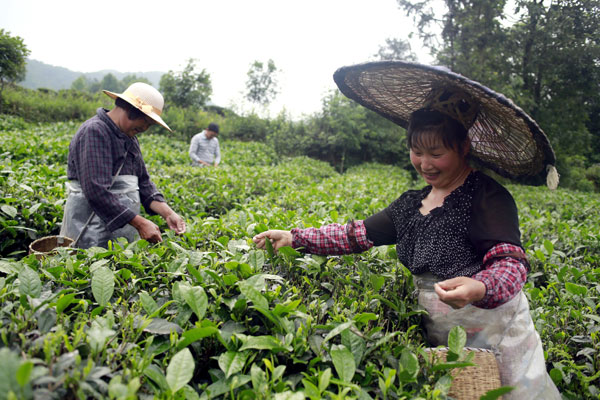Mountains with heart
Updated: 2013-05-23 03:29
(China Daily)
|
||||||||
 |
|
Tea plantations flourish on the fertile soil of Guizhou's mountains. Photo by Feng Yongbin / china daily |
Tea, especially green tea, is growing in popularity; you could say it's a top pick.
China exported about 300,000 tons of tea last year, 30 percent of it green.
The art of picking tea is almost as sublime as its taste, and requires a surgeon's delicacy and optical prowess.
"You can never use your nail or sharp edge like a knife," one picker said. "If you do, you cauterize the cut and it turns black. Each leaf has to be torn, delicately, from the plant."
This is no job for the faint-hearted. Sweltering sun, torrential rain, the body poised to strike and then tear the fragile leaves for hours on end. Perched on mountainsides, this may be a job with scenery to die for but it asks a back-aching price.
Guizhou's mountains stand sentinel, guardians of a beauty most tourists in China never see. In rural parts of the province, far from the madding crowd, the three S's — sight, smell and sound — ravish the senses with a ferocity of lovers reunited.
Tea country has a more subtle, enchanting allure. The rolling hills are not awe-inspiring like the mountains but they are easier on the eye.
The picking season is April to October, and each plant will produce a new leaf every two weeks or so. A leaf picked in Guizhou can be in Beijing within about 40 hours but certain steps have to be taken first.
After picking it is allowed to dry naturally for a few hours, then it is stirred, not shaken, mechanically to give it shape before being shaken to dry it further. After this, it is rattled in what looks like a cement mixer to enhance its flavor.
Once packaged, off it goes for a shelf life before floating invitingly in a cup or glass.
Tea has a special place in Chinese and world history, but only now is green tea getting a bit of the global publicity it deserves.
I am a coffee lover but there are times in the day when I could be unfaithful to the bean, especially in the restful hours after 6 pm when green tea would settle the frayed nerves of a hard day's night.
The province's chili fields are no place for questionable nerves, either. Planted in the spring and picked in the autumn, each plant can produce 200 blood-red chilies. Thirty percent of chilies on sale in Beijing come from the province, shipped within 28 days of picking.
The following day, in bright sunshine, our plans were back on track.
We traveled to a paper-making village, cradled by steep granite gorges. For 600 years the village of Baishuihe in Guiyang, has been cutting and stripping bamboo, mixing it with plum juice, pulping, hanging and drying it out. The paper for ancestral offerings can also be used for calligraphy. It costs 12 yuan ($2) a kilogram. Nature's bounty.
Then onto a nearby Bouyei village that was expecting us for a meal. No guilt here while we hammered the rice, as if it was trying to emerge from the underworld, into a sticky substance, which was then peppered with seeds and eaten in small handfuls.
Maidens fair, in traditional blue costume, offered us rice wine and food. We drank, they sang. This side of paradise? The lines were blurring, we may have stepped over.
Tiny cups were raised to lips and then turned upside down to show that no alcohol remained. Both a tribute and a delightful challenge.
The table was not just groaning under the weight of food but begging for mercy, pleading for us to lighten its load. Laughter competed with birdsong. More maidens singing, more rice wine. Well into the night we stayed, unable to pull ourselves away from the incredible hospitality.
The hour of departure could no longer be denied. Farewells were exchanged with a solemnity that contradicted the previous gaiety. Handshakes seemed inadequate. Full body hugs and claps on the back were called for. Journey's end had been reached. Until we laugh together again, paradise postponed.

 Michelle lays roses at site along Berlin Wall
Michelle lays roses at site along Berlin Wall
 Historic space lecture in Tiangong-1 commences
Historic space lecture in Tiangong-1 commences
 'Sopranos' Star James Gandolfini dead at 51
'Sopranos' Star James Gandolfini dead at 51
 UN: Number of refugees hits 18-year high
UN: Number of refugees hits 18-year high
 Slide: Jet exercises from aircraft carrier
Slide: Jet exercises from aircraft carrier
 Talks establish fishery hotline
Talks establish fishery hotline
 Foreign buyers eye Chinese drones
Foreign buyers eye Chinese drones
 UN chief hails China's peacekeepers
UN chief hails China's peacekeepers
Most Viewed
Editor's Picks

|

|

|

|

|

|
Today's Top News
Shenzhou X astronaut gives lecture today
US told to reassess duties on Chinese paper
Chinese seek greater share of satellite market
Russia rejects Obama's nuke cut proposal
US immigration bill sees Senate breakthrough
Brazilian cities revoke fare hikes
Moody's warns on China's local govt debt
Air quality in major cities drops in May
US Weekly

|

|







